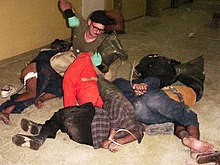Charles Graner
Along with other soldiers of his Army Reserve unit, the 372nd Military Police Company, Graner was accused of allowing and inflicting sexual, physical, and psychological abuse on Iraqi detainees in Abu Ghraib prison, a notorious prison in Baghdad during the United States' occupation of Iraq.
He was sentenced to 10 years in prison, demotion to private, dishonorable discharge and forfeiture of pay and allowances.
[1] On August 6, 2011, Graner was released from the United States Disciplinary Barracks at Fort Leavenworth, Kansas, after serving 6+1⁄2 years of his ten-year sentence.
[3] After graduating from high school in 1986, Graner attended the University of Pittsburgh for two years before dropping out to join the Marine Corps Reserve in April 1988.
In 1994, he began working as a corrections officer at Fayette County Prison in a shift with a "no-nonsense reputation."
[5][7] In 1998, a prisoner accused Graner and three other guards of planting a razor blade in his food, causing his mouth to bleed when he ate it.
"[5] The allegations were denied; although a federal magistrate judge ruled that the charges had "arguable merit in fact and law," the case was dismissed when the prisoner disappeared after his release.
[5] Graner and four other guards were accused of beating another prisoner who had deliberately flooded his cell, taunting anti-capital punishment protesters, using racial epithets and telling a Muslim inmate he had rubbed pork all over his tray of food.
[5] A second lawsuit involving Graner was brought by a prisoner who claimed that guards made him stand on one foot while they handcuffed and tripped him.
[10] Another prisoner, Abdou Hussain Saad Faleh, said Graner forced him to stand on a food box, naked except for a blanket.
[10] Jeremy Sivits, a soldier who pleaded guilty to charges relating to the Abu Ghraib investigation, alleged that Graner once punched a prisoner in the head so hard that he lost consciousness.
On August 23, Graner appeared before military judge Colonel James Pohl at a high-security Army base in the city of Mannheim in southwest Germany.
Graner appeared with Specialist Megan Ambuhl, along with his civilian attorneys and appointed military defense lawyers.
Pohl set January 7, 2005, as the trial date and again denied a defense motion to grant immunity to several witnesses so they could testify without fear of incrimination.
[24] The trial officially began on January 7, at the Williams Judicial Center in Fort Hood, with Colonel James Pohl presiding.
Three soldiers in Graner's unit testified; the first was Specialist Matthew Wisdom, who first reported the situation at Abu Ghraib.
Wisdom said that Graner had enjoyed beating inmates (saying that he had laughed, whistled, and sung) and was the one who first thought of arranging the prisoners in naked human pyramids and other positions.
Al-Sheikh described Graner as the "primary torturer" and said that he had forced him to eat pork, drink alcohol,[29] and thank Jesus for keeping him alive.
[30] Another detainee, Hussein Mutar, testified that Graner had forced him, like al-Sheikh, to eat pork, drink alcohol, and curse Islam.
Private Ivan Frederick (previously convicted of abuse) said he had consulted six senior officers, ranging from captains to lieutenant-colonels, about the guards' actions but was never told to stop.
[35] On January 15, 2005, Graner was found guilty of assault, battery, conspiracy, maltreatment of detainees, committing indecent acts and dereliction of duty and sentenced to 10 years' imprisonment, reduction in rank to private, a dishonorable discharge, and the loss of all pay and benefits.
[36] Defense lawyer Guy Womack contended that Graner and the six other Abu Ghraib guards charged with abuses were being scapegoated.




